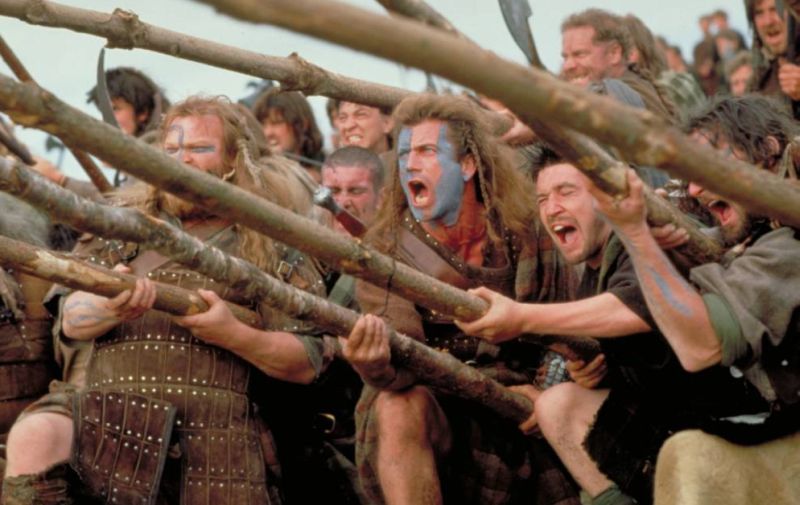The Best of Pictures: Braveheart (1995), by Josh Long
28 Feb
BRAVEHEART (1995)
Directed by: Mel Gibson
Written by: Randall Wallace
Starring: Mel Gibson, Sophie Marceau, Patrick McGoohan, Brendan Gleeson, Angus MacFadyen
Like or hate Mel Gibson, he has undoubtedly created some of the most striking and memorable images in modern American film. He was already a Hollywood icon when he began the transition into directing. Some of his beliefs have gotten him into trouble especially in recent years, but he also clearly has ideas with which the American psyche identifies. In Braveheart he presented those ideas to us as director and producer – and won Oscar gold for both 1.
Braveheart is a film that succeeds at capturing the old-style Hollywood sense of the “epic.” The Hollywood epic is its own distinct creation, pointedly unique from the classical sense of “epic.” The Hollywood epic follows a heroic, larger than life character through a journey against the greatest odds, and to an extreme scale. It is imbued with a sense of the mythical, though it is still grounded in realism, tied to the ground by the reality of actors and a visible space. Literature, particularly classic literature, is allowed more hyperbole in its sense of mythics, because we don’t see characters physically. They are free to be as spectacular as we can imagine. But live-action film as an art form shows us live, physical people, and real places and interactions. This gives the Hollywood epic the opportunity to touch viewers on a more personal level.
Braveheart performs well on the line between the mythical and the visceral. Through somewhat stylized battle sequences, use of slow motion, dream sequences and the like, the proportions of the story seem otherworldly. But the sincerity in the performances and intense sequences of violence remind us that this is a true story, and draws us to the parallels in our world.
The themes are firmly rooted in good-old American values. There is a clear sense of right and wrong, a strong hero who urges men to fight for their freedom, and is willing to risk everything for that ideal. There is the sense of fighting for your people, but what appeals most to modern Americans is still the same sense of individualism that draws us to Westerns. For Americans freedom is very much about individualism, about making one’s own decisions and not following orders. People universally have a will to be free, and viewers identify with William Wallace’s fight for freedom on an epic scale.
There is however a problem with the way this film has reached near-Biblical status within the Christian church. Recent trends toward “re-capturing manhood” have championed Braveheart as the model for true manliness. Author John Eldredge even goes so far as to compare Jesus to William Wallace in his book Wild at Heart. On the one hand, there is something to be said for boldness and standing up for what’s right in the face of insurmountable odds. This is the same example as we see in Moses, David, and ultimately Jesus. However, let us keep in mind what actually happens in Braveheart.
William Wallace is not a wise, righteous man who fights because he sees a wrong that must be righted. The impetus for all of his fighting is revenge. His family is killed by the British when he’s a child. His wife is kidnapped (after an attempted rape) and murdered by the British. These are the inciting events that lead him on the path to revolution, not a bold commitment to what’s right. There are other elements of his character (even, as a stretch, the ultimate self-sacrifice) which echo Jesus, but the brash warrior yelling “they’ll never take our freedom” is not one of them 2. This should be even more obvious looking at Jesus’ historical context. He came to a people, His people in every sense of the phrase, who lived under a tyrannical government. That same government was at least as oppressive as the 14th century British, and would ultimately put the hero (Jesus) to death. But Jesus does not lead his people in revolt against the Romans. On the contrary, he tells them to pay their taxes! William Wallace is the type of Jesus that the Jews were expecting – the Jesus they got was very, very different.
The thing about Braveheart that stands out most in the memory is the scope of the film, be it in setting, subject, budget, violence, or even length. And this is probably as it should be. The film doesn’t do anything new with the genre, doesn’t raise challenging issues, doesn’t speak to contemporary struggles – but it’s about something that gets you riled up, and it’s huge. While the acting and directing are consistent to that “epic” approach, neither is particularly outstanding. The success of the film is piling layer on layer until you have a mountain of a movie.
Though William Wallace might not be the best role model, there is still something compelling about what he believes and his boldness despite the odds. And though Braveheart isn’t a filmic masterpiece, it certainly gets its audience excited 3. Is that enough to say it’s a great film? Hard to say. But it’s certainly not one that will sit back and be ignored.
1. Gibson did of course star in the film as well, but didn’t receive a nomination for his efforts. The winner that year was Nicholas Cage for Leaving Las Vegas.
2. We are given a very clear picture of the man Jesus was in the Bible, and Christians should be careful not to make him fit the mold of more exciting cultural tropes.
3. The Best Picture win is probably appropriate, considering the competition that year. There were no clear masterpieces passed over. Quite a range of selections though – from Braveheart to Babe.




No comments yet